英美文学史Henry David Thoreau
美国文学 Henry David Thoreau 梭罗
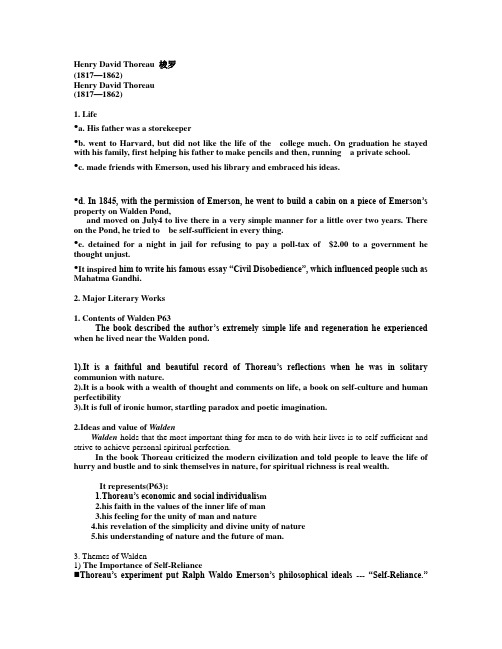
Henry David Thoreau 梭罗(1817—1862)Henry David Thoreau(1817—1862)1. Life•a. His father was a storekeeper•b. went to Harvard, but did not like the life of the college much. On graduation he stayed with his family, first helping his father to make pencils and then, running a private school. •c. made friends with Emerson, used his library and embraced his ideas.•d. In 1845, with the permission of Emerson, he went to build a cabin on a piece of Emerson’s property on Walden Pond,and moved on July4 to live there in a very simple manner for a little over two years. There on the Pond, he tried to be self-sufficient in every thing.•e. detained for a night in jail for refusing to pay a poll-tax of $2.00 to a government he thought unjust.•It inspired him to write his famous essay “Civil Disobedience”, which influenced people such as Mahatma Gandhi.2. Major Literary Works1. Contents of Walden P63The book described the author’s extremely simple life and regeneration he experienced when he lived near the Walden pond.1).It is a faithful and beautiful record of Thoreau’s reflections when he was in solitary communion with nature.2).It is a book with a wealth of thought and comments on life, a book on self-culture and human perfectibility3).It is full of ironic humor, startling paradox and poetic imagination.2.Ideas and value of WaldenWalden holds that the most important thing for men to do with heir lives is to self-sufficient and strive to achieve personal spiritual perfection.In the book Thoreau criticized the modern civilization and told people to leave the life of hurry and bustle and to sink themselves in nature, for spiritual richness is real wealth.It represents(P63):1.Thoreau’s economic and social individualis m2.his faith in the values of the inner life of man3.his feeling for the unity of man and nature4.his revelation of the simplicity and divine unity of nature5.his understanding of nature and the future of man.3. Themes of Walden1) The Importance of Self-RelianceThoreau’s experiment put Ralph Waldo Emerson’s philosophical ideals --- “Self-Reliance.”into practice. Self-reliance is economic and social.Socially, Thoreau dwells on the contentment of his solitude, on his finding entertainment in the laugh of the loon and the march of the ants rather than in balls, marketplaces, or salons.Economically, he support himself through his own labor.2) SimplicityIn his “Economy” chapter, Thoreau asserts that a feeling of dissatisfaction with one’s possessions can be resolved in two ways:one may acquire more,;or reduce one’s desires.Thoreau patches his clothes instead of buying new ones;He builds his own shack instead of getting a bank loan to buy one.For Thoreau, anything more than what is useful is an extravagance.4. Symbols in Walden1) Walden pond(1) symbolizes the alternative to, and withdrawal from, social conventions and obligations.(2) symbolizes the vitality and tranquility of nature.A clue to the symbolic meaning of the pond lies in two of its aspects:a. its depth, is to be infiniteb. its pure and reflective quality.2) AnimalsAs Thoreau’s chief companions after he moves to Walden Pond, animals inevitably symbolize his retreat from human society and closer intimacy with the natural world.Thoreau devotes much attention in his narrative to the behavior patterns of woodchucks土拨鼠, partridges鹌鹑, loons潜鸟, and mice, among others.For example, Thoreau’s observatio n of the partridge and its young walking along his windowsill elicits a meditationon motherhood and the maternal urge to protect one’s offspring.5. Styles of Walden P55/63fresh, new, associative:1) Vivid descriptionas when he descri bes the sun as “too warm a friend”2) the use of poetic devicessuch as personification: when he drags his desk and chair out for housecleaning, he describes them as being happy outdoors and reluctant to go back inside.3) richly allusive style and command of epigrammatic statement4) skillful use of symbolic analogyas the “Ponds” chapter becomes a delicate allegory for the purity of the human soul.5) original sense of languageThoreau’s Point of ViewComparing with Emerson who was a great thinker,Thoreau was a great experimentalistwho put Emerson's Transcendental doctrines into practice in the actual life.⏹did not like the way a materialistic America was developing and was strongly outspoken(直言的) on the point⏹hated the human injustice as represented by the slavery system⏹saw nature as a genuine restorative(有助健康的), healthy influence on man’s spiritual well-being▪had faith in the inner virtue and inward, spiritual grace of man▪was very critical of modern civilization.He thought modern civilized life has dehumanized man and placed him in a spiritual quandary, by trying to amass material possessions, man is not really living; he is digging his own grave.6. He was impatient with his fellowmen who did not want to spend so little time on the self-improvement.7. had trust in the future。
英美文学史简介

英美文学史简介Part A British LiteratureⅠEarly and Medieval English Literature 早期及中世纪英国文学1. “Beowulf”, the national epic of the English people.《贝奥武夫》(Beowulf),完成于八世纪,约750年左右的英雄叙事长诗,长达3000多行。
是以古英语记载的传说中最古老的一篇。
是现存古英文文学中最伟大之作,也是欧洲最早的方言史诗。
2. Geoffrey Chaucer ,the founder of English poetry.乔叟(1343-1400),英国诗歌之父.The Canterbury Tales 《坎特伯雷故事集》, 以一伙来自社会各个阶层的香客在宗教朝圣的路上讲述故事为线索,向我们清楚地展示了那个时代人们的生活。
在所有的23个故事中,除了两篇之外,其余都是诗歌体裁的作品。
ⅡThe Renaissance [ri′neis(ə)ns] 文艺复兴时期文学1.William Shakespeare 莎士比亚(1564~1616)英国文艺复兴时期伟大的剧作家、诗人,欧洲文艺复兴时期人文主义文学的集大成者。
莎士比亚给世人留下了37部戏剧play,其中包括一些他与别人合写的一般剧作。
此外,他还写有154首十四行诗sonnet和三、四首长诗poem。
四大喜剧: A Midsummer Night’s Dream 仲夏夜之梦The Merchant of Venice 威尼斯商人As You Like It 皆大欢喜Twelfth Night 第十二夜四大悲剧:Hamlet 哈姆雷特(To be, or not to be, that is the question)Othello 奥赛罗King Lear 李尔王Macbeth 麦克白其他:Romeo and Juliet 罗密欧与朱丽叶2.Francis Bacon 培根(1561-1626 )The founder of English materialist philosophy and modern science.Bacon is especially famous for his Essays.培根,英国唯物主义和现代科学奠基人,散文家.代表作:散文Of Studies 《论学习》ⅢThe period of English Bourgeois [buə′ʒwɑ:] Revolution and Restoration 资产阶级革命时期文学1.John Milton 米尔顿Paradise Lost 《失乐园》2. John Bunyan 班扬The Pilgrim’s Progress 《天路历程》ⅣEighteenth Century English Literature 十八世纪英国文学1. Daniel Defoe: 笛福Robinson Crusoe 《鲁滨逊漂流记》2. Jonathan Swift:斯威夫特Gulliver’s Travels 《格列佛游记》3. Henry Fielding 菲尔丁the Founder of the English Realistic Nov 英国现实主义小说奠基人Joseph Andrew 《约瑟夫·安德鲁》4. William Blake 布莱克and Robert Burns彭斯: PoetⅤRomanticism in England 浪漫主义时期文学1. William Wordsworth 华滋华斯the representative poet of the early romanticism. 标志着浪漫主义的开始2. George Gordon Byron 拜伦Don Juan 《唐·璜》3. Percy Bysshe Shelley 雪莱Prometheus Unbound《解放了的普罗米修斯》If winter comes, can spring be far behind? 冬天来了,春天还会远吗?4. John Keats 济慈Ode to a Nightingale 《夜莺颂》5. Jane Austen 简·奥斯汀Pride and Prejudice 《傲慢与偏见》ⅥThe Victorian Age 维多利亚时期文学1. Charles Dickens 狄更斯代表作:Oliver Twist 《雾都孤儿》、A Tale of Two Cities《双城记》、David Copperfield 《大卫·科波菲尔》2. William Makepeace Thackeray 萨克雷代表作:Vanity Fair 《名利场》3. George Eliot 乔治·艾略特4. The Brontë Sisters 勃朗特三姐妹Charlotte Brontë夏洛蒂·勃朗特:Jane Eyre《简·爱》Emily Brontë艾米莉·勃朗特:Wuthering Heights 《呼啸山庄》Annie Brontë安妮·勃朗特5. The Brownings 勃朗宁夫妇Husband: Robert BrowningWife: Elizabeth BrowningSonnets from the Portuguese 《葡语十四行诗集》ⅦTwentieth Century English Literature 20世纪英国文学1. Thomas Hardy 托马斯·哈代Tess of the d’Urbervilles《德伯家的苔丝》2. John Galsworthy 高尔斯华绥3. Oscar Wilde 王尔德Poet,dramatist, novelist and essayist.The Happy Prince and Other Tales 《快乐王子和其他故事》4. George Bernard Shaw 萧伯纳the most important English dramatist5. D. H. Lawrence 劳伦斯Lady Chatterley’s Lover 《查泰来夫人的情人》6. Virginia Woolf 伍尔芙Feminism, the stream of consciousness意识流女权主义与现代主义小说的先驱7. James Joyce 乔伊斯Ulysses《尤里西斯》the stream of consciousness意识流Part B American LiteratureⅠThe Literature During the Colonial American and the American Revolution殖民地时期及独立战争时期的文学Benjamin Franklin 本杰明·富兰克林ⅡAmerican Romanticism and New England Literature 浪漫主义及新英格兰时期文学1. Washington Irving华盛顿•欧文(1783-1859)the first American to achieve an international literary reputation. 是美国文学的奠基人之一。
3.7 Henry David Thoreau's Walden---lhy
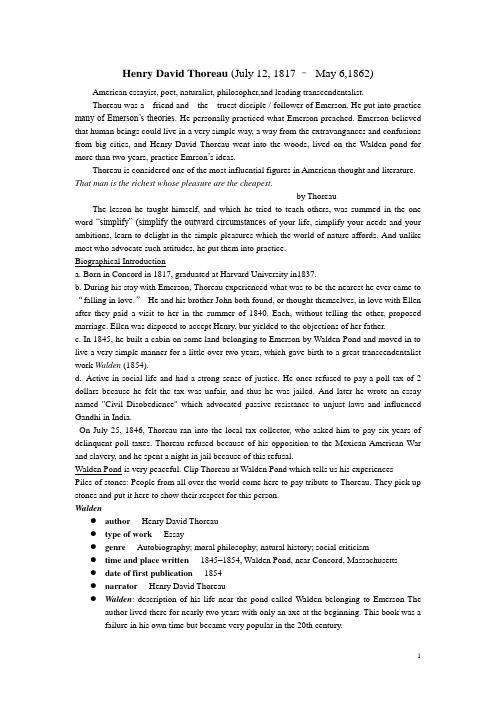
Henry David Thoreau (July 12, 1817 –May 6,1862)American essayist, poet, naturalist, philosopher,and leading transcendentalist.Thoreau was a friend and the truest disciple / follower of Emerson. He put into practice many of Emerson’s theories. He personally practiced what Emerson preached. Emerson believed that human beings could live in a very simple way, a way from the extravangances and confusions from big cities, and Henry David Thoreau went into the woods, lived on the Walden pond for more than two years, practice Emrson’s ideas.Thoreau is considered one of the most influential figures in American thought and literature. That man is the richest whose pleasure are the cheapest.----by ThoreauThe lesson he taught himself, and which he tried to teach others, was summed in the one word ―simplify‖ (simplify the outward circumstances of your life, simplify your needs and your ambitions, learn to delight in the simple pleasures which the world of nature affords. And unlike most who advocate such attitudes, he put them into practice.Biographical Introductiona. Born in Concord in 1817, graduated at Harvard University in1837.b. During his stay with Emerson, Thoreau experienced what was to be the nearest he ever came to “falling in love.”He and his brother John both found, or thought themselves, in love with Ellen after they paid a visit to her in the summer of 1840. Each, without telling the other, proposed marriage. Ellen was disposed to accept Henry, bur yielded to the objections of her father.c. In 1845, he built a cabin on some land belonging to Emerson by Walden Pond and moved in to live a very simple manner for a little over two years, which gave birth to a great transcendentalist work Walden (1854).d.Active in social life and had a strong sense of justice. He once refused to pay a poll-tax of 2 dollars because he felt the tax was unfair, and thus he was jailed. And later he wrote an essay named "Civil Disobedience" which advocated passive resistance to unjust laws and influenced Gandhi in India.On July 25, 1846, Thoreau ran into the local tax collector, who asked him to pay six years of delinquent poll taxes. Thoreau refused because of his opposition to the Mexican-American War and slavery, and he spent a night in jail because of this refusal.Walden Pond is very peaceful. Clip Thoreau at Walden Pond which tells us his experiencesPiles of stones: People from all over the world come here to pay tribute to Thoreau. They pick up stones and put it here to show their respect for this person.Walden●author · Henry David Thoreau●type of work · Essay●genre · Autobiography; moral philosophy; natural history; social criticism●time and place written · 1845–1854, Walden Pond, near Concord, Massachusetts●date of first publication · 1854●narrator · Henry David Thoreau●Walden: description of his life near the pond called Walden belonging to Emerson Theauthor lived there for nearly two years with only an axe at the beginning. This book was a failure in his own time but became very popular in the 20th century.●Walden presented Thoreau's unusual interest in nature and showed his individualismwhich inherited from American Puritanism. The book described the author's extremely simple life and regeneration he experienced when he lived near the Walden pond where he put Emerson's Transcendental doctrines into practice in the actual life.●It is a diary of a nature-lover containing essays of a self-reliant character.●He appeals to the primitive instinct that lies close to the heart of every man.●He saw nature as a genuine restorative , healthy influence on man’s spiritual well-being,and regarded it as a symbol of spirit.●Do not hire a man who does your work for money, but him who does it for love of it.●Go confidently in the direction of your dreams!●Live the life you’ve imagined. As you simplify your life, the laws of the universe will besimpler.●If you would convince a man that he does wrong, do right. Men will believe what theysee.●Men are born to succeed, not fail.●Men have become the tools of their tools.Contents (14 parts)● 1. Economy● 2. Where I Lived, and What I Lived For● 3. Reading4. Sounds5. Solitude6. Visitors7. The Bean-Field8. The Village●9. The Ponds10. Baker Farm11. Higher Laws12. Brute Neighbors●13. House-Warming14. Former Inhabitants and Winter Visitors●15. Winter Animals16. The Pond in Winter17. Spring18. ConclusionWalden●It came out of Thoreau’s two-year experiment at Walden Pond. It stresses the importanceof thought over material circumstance. He believed that there was the possibility for and importance of change in one’s spiritual life which is in harmony with nature. Emerson’s best friend.Thoreau’s ideas embodied in his Walden1.He saw nature as a genuine restorative healthy influence on man’s spiritual well-being, andregarded it as a symbol of spirit. He firmly believes that ―nature objects and phenomena are the original symbols or types which express our thoughts and feelings.‖ He was seen lost in contemplation of the world around. 沃尔登中的第一个重要观点是:自然当作是真正的能够帮助人恢复本真的,具有教育意义的,精神的象征。
Henry David Thoreau

Henry David Thoreau(1817-1862)1. American writer, philosopher, and naturalist2.American essayist and poet3.Leader of American TranscendentalismThoreau's TranscendentalismHenry David Thoreau (1817-1862) is most often mentioned as inspired by Emerson, the most representative of the phi1osophical and literary school which is American Transcendenta1ism. Thoreau embraced his master's ideas as a disciple. In 1845 he built a cabin on some land belonging to Emerson by Walden Pond and moved in to live there in a very simple manner for a litt1e over two years, which gave birth to a great transcendentalist work Walden (1854). The book not only fully demonstrates Emersonian ideas of self-reliance but also develops and tests Thoreau's own transcendental philosophy.(1)For Thoreau, nature is not merely symbolic, but divine in itself and human beings can receive precise communication from the natural world by way of pure senses. So he was often alone in the woods or by thepond, lost in spiritual communion with nature.(2)Thoreau strongly believed in se1f-culture and was eager to identify himself with the Transcendental image of the self-reliant man. To achieve personal spiritual perfection, he thinks, the most important thing for men to do with their lives is to be self-sufficient, so he sought to reduce his physical needs and material comforts to a minimum to get spiritual richness.(3)His positiveness about the importance of individual conscience was so great that he even considered the society as fetters of the freedom of individuals.Works1. Walden, or Life in the Woods 18542. Civil Disobedience 18493. Life Without Principle 18634. A Week on the Concord and Merrimack Rivers 18495. The Maine Woods 18646. Cape Cod 18657. Slavery in Massachusetts 1854Evaluation1.He became one of the three great American authors of the 19th century who had not contemporary readers and yet became great in this century, the other two being Herman Melville and Emily Dickinson.2.His influence goes beyond America. His statue was placed in the hall of Fame in New York in 1969 alongside those of other great Americans.3.Thoreau has been regarded as a prophet of individualism in American literature. He was very critical of modern civilization. “Civilized man is the s alve of matter.”Comment on Walden1. Between the end of March 1845 and July4, Thoreau constructed a cabin on the shore of Walden Pond, near Concord. There he lived alone until September 1847, supplying his needs by his own labor and developing and testing his transcendental philosophy of individualism, self-reliance and material economy for the sake of spiritual wealth.2. He sought to reduce his physical needs to aminimum, in order to free himself for study, thought, and observation of nature, himself. Therefore his cabin was a simple room and he wore the cheapest essential clothing and restricted his diet to what he found.3.Walden can be many things and can be read on more than one level. But it is, first and foremost, a book about man, what he is, and what he should be and must be.4.Thoreau has faith in the inner virtue and inward, spiritual grace of man. He holds that the most important thing for men to do with their lives is to be self-sufficient and strive to achieve person spiritual perfection. Thoreau was very critical of modern civilization. “Civilized man is the slave of matter,” he said on one occasion.5. Considered one of the all-time great books, Walden is a record of Thoreau's two year experiment of living at Walden Pond. The writer's chief emphasis is on the simplifications and enjoyment of life now. It is regarded as6.It exhibits his calm trust in the future andhis ardent belief in a new generation of men. The book concludes on a clear note of optimism and hope.7. Regeneration became one of its major thematic concerns and decided its structural framework. The whole book is within the frame of a single year, and progresses through summer and autumn to winter, and finally to a climax in the renascence of spring.Writing style of WaldenA . Prophetic V oice. The epigraph of Walden in a good example of how Thoreau was trying to be a prophet in this book. “I do not proposes to write an ode to dejection or sorrow but rather to brag as lustily as a chanticleer( rooster) in the morning standing on his roost if only to wake my neighbors up”That is Thoreau’s tone in much of this book.B. Direct Forceful Sentence. The transcendentalists were characterized by their moral earnestness. They were like Puritan preachers interested in conveying an importantmessage. The short clear direct sentences of much concerned to get his message across..C. Conversational in Tone. Often it seems tat Thoreau was talking to the reader rather than that he was putting his words on paper. This is another example of how eager he was to get his message across. On the surface , his essay seem to be nothing but casual accounts of his personal experience. In fact, they are carefully designed to carry his philosophical messages to the readers.D. humor, He achieved humor in four ways-------through puns, satire, irony, and sarcasm.E. Proverbial Expressions. Thoreau used a minimum of words to put a maximum of meaning.F. Brief Tales, Fables and Allegories. He made them fit very smoothly into the subject that he was discussing.The Reputation of Henry David ThoreauEmerson: "He was bred to no profession; he never went to church; he never voted; he refused to pay a tax to the State; he ate no flesh; hedrank no wine; he never knew the use of tobacco; and, though a naturalist, he used neither trap nor gun."▪Ellery Channing (poet, friend, and biographer): "Thoreau was the Poet-Naturalist, a sweet singer of woodland beauty."▪Frank Sanborn (young Abolitionist friend and biographer): He was a Concord warrior, a later embattled farmer."▪John Macy (early Socialist critic): "A powerful literary radical, but a little too selfish and aloof to be a good Socialist."▪Paul Elmer More: "He was one of Rousseau's wild men, but moving toward the higher self-restraint of neo-humanism's inner-check." ▪Lewis Mumford: "He was the Father of our National & State Parks."▪James Russell Lowell: "He was a Transcendentalist crackpot怪人and phony(impostor; a hypocrite)who insisted on going back to flint and steel when he had a matchbox in his pocket; a fellow to the loonieswho thought bran or wearing of the substitution of hooks and eyes for buttons would save the world."Thoreau’s Involvement in Public AffairsWriting Walden was the high point of Thoreau's life and his main manifesto. Y et there were other important things that involved him. He believed that 1.a writer's work and his life should be one, though he sometimes asserted the opposite. At any rate, he devoted both his writing and his life increasingly to public issues2.With word and deed he had fought against the Mexican-American war of the mid-1840s. And in the next decade he became totally involved in the struggle against slavery. In John Brown he found his only hero: he became Brown's friend and ardent defender, and after Brown's raid on Harpers Ferry Thoreau spoke out for him in the fieriest words he ever used.3.Thoreau always marched to the sound of his own drum, as he said in one of his most enduring aphorisms, and yet the changing times had some effect on him. In the 1840s he was still advising theabolitionists to free themselves before trying to free the slaves, but by the time he stood up for John Brown, he had become a confirmed abolitionist himself4. In the 1840s he still opposed war both in theory and practice. Yet when the Civil War came, he welcomed it. The thing that distinguished him was a matter of degree: he demonstrated, far more than most men, that his actions resulted from a consistent application of his personal philosophy.Emerson's Assessment1. The best analysis of Thoreau's character was Emerson's funeral elegy for him. Emerson was well aware of Thoreau's devotion to his principles and said that he "had a perfect probity." Emerson also realized, perhaps better than anyone else, that Thoreau gave an edge to his probity by his willingness to say no, to dispute, to deny.2. He could have been a notable leader, given all those qualities, but, Emerson remarked sadly, Thoreau chose instead to be merely the captain of a huckleberry party. Nevertheless, Thoreau was a remarkable man, andEmerson gave him the highest possible praise by calling him wise. "His soul, " said Emerson in conclusion, "was made for the noblest society."3. Emerson characterized Thoreau as a hermit and stoic but added that he had a softer side which showed especially when he was with young people he liked. Furthermore, Thoreau was resourceful and ingenious; he had to be, to live the life he wanted. He was patient and tenacious, as a man had to be to get the most out of nature.。
Henry David Thoreau

Thoreau thought if a law was unjust people could resist it; if a government was inefficient and unendurable people could overthrow it. His interest in abolition of slavery and his refusal to pay toll taxes were consistent with his belief in the essay.Thoreau was an individualist, distrusting group action and preferrring to depend on individual reform for the improvement of society. In his own words: “we should be men first, and subjects afterward.” To him, the regeneration of society could only come about the regeneration of the individual, Thus he wanted to have such a utopian State “which can afford to be just to all men, and to treat the individual with respect as a neighbor.”
Civil disobedience is one of the many ways people have rebelled against unfair laws. In seeking an active form of civil disobedience, one may choose to deliberately break certain laws, such as by forming a peaceful blockade(障碍物) or occupying a facility illegally. Protesters practice this non-violent form of civil disorder with the expectation that they will be arrested, or even attacked or beaten by the authorities. Protesters often undergo training in advance on how to react to arrest or to attack, so that they will do so in a manner that quietly or resists without threatening the authorities.
12 全套美国文学精心整理的各个时期作家作品简介Henry David Thoreau
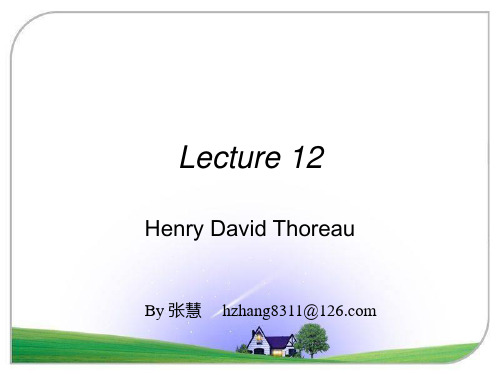
Evaluation of Thoreau
• An active transcendentalist who put into practice many of Emerson’s theories • A prophet of individualism in American literature • Ideas influenced Gandhi and Martin Luther King
Writing Style
• Style
– Full of epigrams and Proverbial Expressions – Tone: Conversational and humorous – Figure of speech
• Metaphors • Brief Tales, Fables and Allegories
– Born in a poor family in Concord, Massachusetts in 1817 – Father: an unsuccessful storekeeper and maker of pencils – Mother: ambitious, sent Thoreau to Harvard though he did not like the life and curriculum there
Henry David Thoreau (1817-1862)
• esspher
• naturalist • Leader of American Transcendentalism
Biographical Introduction (1)
• Family Background
What transcendental ideas can you find in Walden?
2013-10 Henry David Thoreau
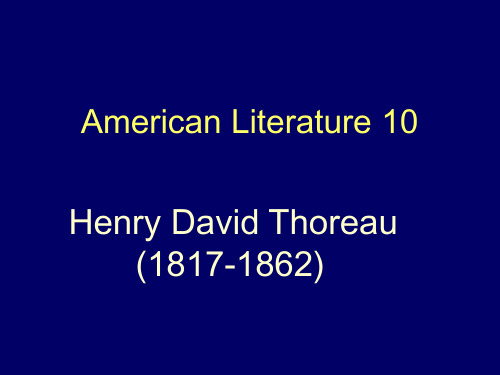
3. His style
- A heightened passion, a natural and living energy. - Symbolism --- Walden pond: the mark of transcendentalism, the thinking in imagery. - Language: Directness of style; The suggestion of far more than appears on the surface; Every sentence is fabulous; Every word is shining. It is refreshing and stirs my heart. - Paradox, exaggeration, humor and irony, etc.
- Born in 1817, Concord, Mass. - Attended Concord Academy, and Harvard. - After graduation (1837), working in his father’s pencil factory. - Teaching at school for a short time. - Running a private school with his brother for two years.
- His experiment --- a reminder that we should not forget the pleasure of living near to nature. - Thoreau proved how far he could free himself from the hypocrisies and unnecessary complexities of the commercial society.
Thoreau
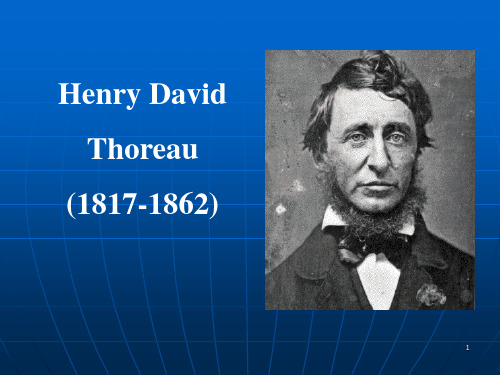
13
“Civil Disobedience”
He spent only one night in jail but it resulted in his most famous and most influential
essay “Civil Disobedience.”
to move in the opposite direction.”
35
Importance of the Work
It was Gandhi’s guidebook for his campaign to free
India from British rule.
17
Importance of the Work
It was adopted by resistance movements under Nazi occupation in Europe in 1940’s.
in touch with nature.
27
精彩片段
一个人越是有许多事情能够放得下,他越是富有。 我时常看到一个诗人,在欣赏了一片田园风景中最珍贵 部分之后,就扬长而去,那些固执的农夫还以为他拿走 的仅是几枚野苹果。诗人却把他的田园押上了韵脚,这
ቤተ መጻሕፍቲ ባይዱ
么一道肉眼不能见的篱笆已经把它圈了起来,还挤出了
32
Themes
It stresses the importance of self-reliance,
closeness to nature, and contemplation in
- 1、下载文档前请自行甄别文档内容的完整性,平台不提供额外的编辑、内容补充、找答案等附加服务。
- 2、"仅部分预览"的文档,不可在线预览部分如存在完整性等问题,可反馈申请退款(可完整预览的文档不适用该条件!)。
- 3、如文档侵犯您的权益,请联系客服反馈,我们会尽快为您处理(人工客服工作时间:9:00-18:30)。
—— By Serena
Henry David Thoreau
He born in Boston and his ancestor came from French. He has mother, father and a brother. He was great American writer, philosopher and naturalist, whose work demonstrates how the abstract ideals of libertarianism and individualism can be effectively instilled in a person's life.
Summary:
Rencently, with rapdly development of economy, we have tp pusiut the matertial life. we only pay attention to power and money. However, what I want to say is that we should not ignore the spiritual life. Or you will lose yourself and have no idea about who you are and what you really want to get.
Thank You !!!
Death: Concord, Massachusetts, May 6, 1862
His Major Works
1. A Week on the Concord and Merrimac Rivers , 1849 2. Civil Disobedience ,1849 3. Slavery in Massachusetts ,1854 4. Walden ,1854 5. The Maine Woods ,1864 6. Early Spring in Massachusetts,1881
Walden
Walden:
• Walden mainly talked about Thoreau life and thoughts during he lived in the woods near walden pond. • Thoreau was close to nature and make himself as a part of nature.
Walden's Influence:
The influence to the time it was published: After Walden published, people admitted that he was the first creator of the nature of essays.Walden is , first and foremost, a book on self-culture and human perfectibility. Before walden published, there was only with "letters", "flash-back" and "magazine article" in the form of reports talking about nature. It is Thoreau that give natual prose a new conception. The influence on nowadays: Thoreau completely use his own hands to build house, feeding live a primitive simple life. He want to prove to the world through his own practice that people should not only focused on the endless pursuit of money and power. we should use more time to do things you really like.
His lifetime
Birth: on Boston, July 12, 1817
1833-1837,studing at Harvard University 1837, as a teacher after graduation 1841, begining to wtriting influenced by Ralph Waldo Emerson 1845-1847, living in walden lake cabin. 1848, beginning his professional lectures 1854,pe animals living in the woods, the plants and flowers and all peaceful life.
• He described the charming and beautifu nature senery and visitors who were honest, thinkable and loving their life.
